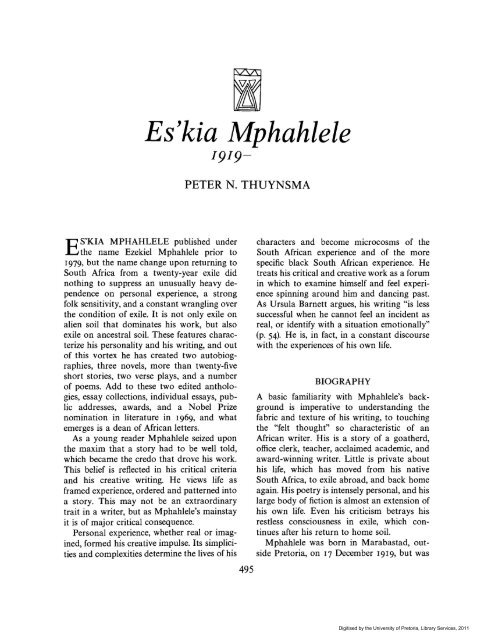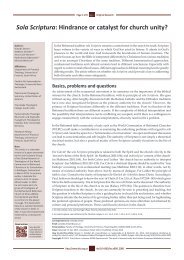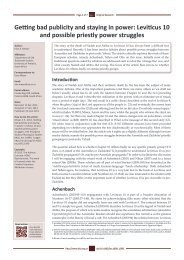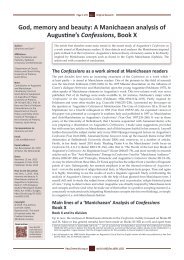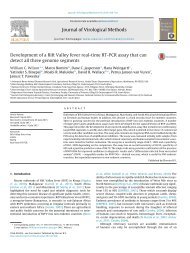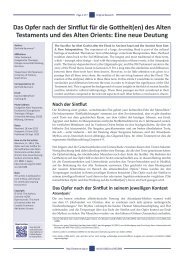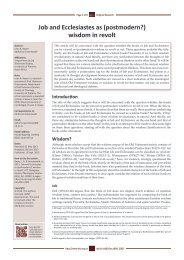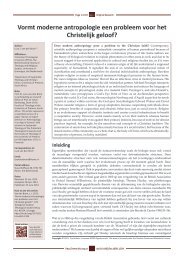Es'kia Mphahlele - University of Pretoria
Es'kia Mphahlele - University of Pretoria
Es'kia Mphahlele - University of Pretoria
You also want an ePaper? Increase the reach of your titles
YUMPU automatically turns print PDFs into web optimized ePapers that Google loves.
I<br />
<strong>Es'kia</strong> <strong>Mphahlele</strong><br />
/9/9-<br />
ES'KIA MPHAHLELE published under<br />
the name Ezekiel <strong>Mphahlele</strong> prior to<br />
1979, but the name change upon returning to<br />
South Africa from a twenty-year exile did<br />
nothing to suppress an unusually heavy dependence<br />
on personal experience, a strong<br />
folk sensitivity, and a constant wrangling over<br />
the condition <strong>of</strong> exile. It is not only exile on<br />
alien soil that dominates his work, but also<br />
exile on ancestral soil. These features characterize<br />
his personality and his writing, and out<br />
<strong>of</strong> this vortex he has created two autobiographies,<br />
three novels, more than twenty-five<br />
short stories, two verse plays, and a number<br />
<strong>of</strong> poems. Add to these two edited anthologies,<br />
essay collections, individual essays, public<br />
addresses, awards, and a Nobel Prize<br />
nomination in literature in 1969, and what<br />
emerges is a dean <strong>of</strong> African letters.<br />
As a young reader <strong>Mphahlele</strong> seized upon<br />
the maxim that a story had to be well told,<br />
which became the credo that drove his work.<br />
This belief is reflected in his critical criteria<br />
and his creative writing. He views life as<br />
framed experience, ordered and patterned into<br />
a story. This may not be an extraordinary<br />
trait in a writer, but as <strong>Mphahlele</strong>'s mainstay<br />
it is <strong>of</strong> major critical consequence.<br />
Personal experience, whether real or imagined,<br />
formed his creative impulse. Its simplicities<br />
and complexities determine the lives <strong>of</strong> his<br />
PETER N. THUYNSMA<br />
495<br />
characters and become microcosms <strong>of</strong> the<br />
South African experience and <strong>of</strong> the more<br />
specific black South African experience. He<br />
treats his critical and creative work as a forum<br />
in which to examine himself and feel experience<br />
spinning around him and dancing past.<br />
As Ursula Barnett argues, his writing "is less<br />
successful when he cannot feel an incident as<br />
real, or identify with a situation emotionally"<br />
(p. 54). He is, in fact, in a constant discourse<br />
with the experiences <strong>of</strong> his own life.<br />
BIOGRAPHY<br />
A basic familiarity with <strong>Mphahlele</strong>'s background<br />
is imperative to understanding the<br />
fabric and texture <strong>of</strong> his writing, to touching<br />
the "felt thought" so characteristic <strong>of</strong> an<br />
African writer. His is a story <strong>of</strong> a goatherd,<br />
<strong>of</strong>fice clerk, teacher, acclaimed academic, and<br />
award-winning writer. Little is private about<br />
his life, which has moved from his native<br />
South Africa, to exile abroad, and back home<br />
again. His poetry is intensely personal, and his<br />
large body <strong>of</strong> fiction is almost an extension <strong>of</strong><br />
his own life. Even his criticism betrays his<br />
restless consciousness in exile, which continues<br />
after his return to home soil.<br />
<strong>Mphahlele</strong> was born in Marabastad, outside<br />
<strong>Pretoria</strong>, on 17 December 1919, but was<br />
Digitised by the <strong>University</strong> <strong>of</strong> <strong>Pretoria</strong>, Library Services, 2011


